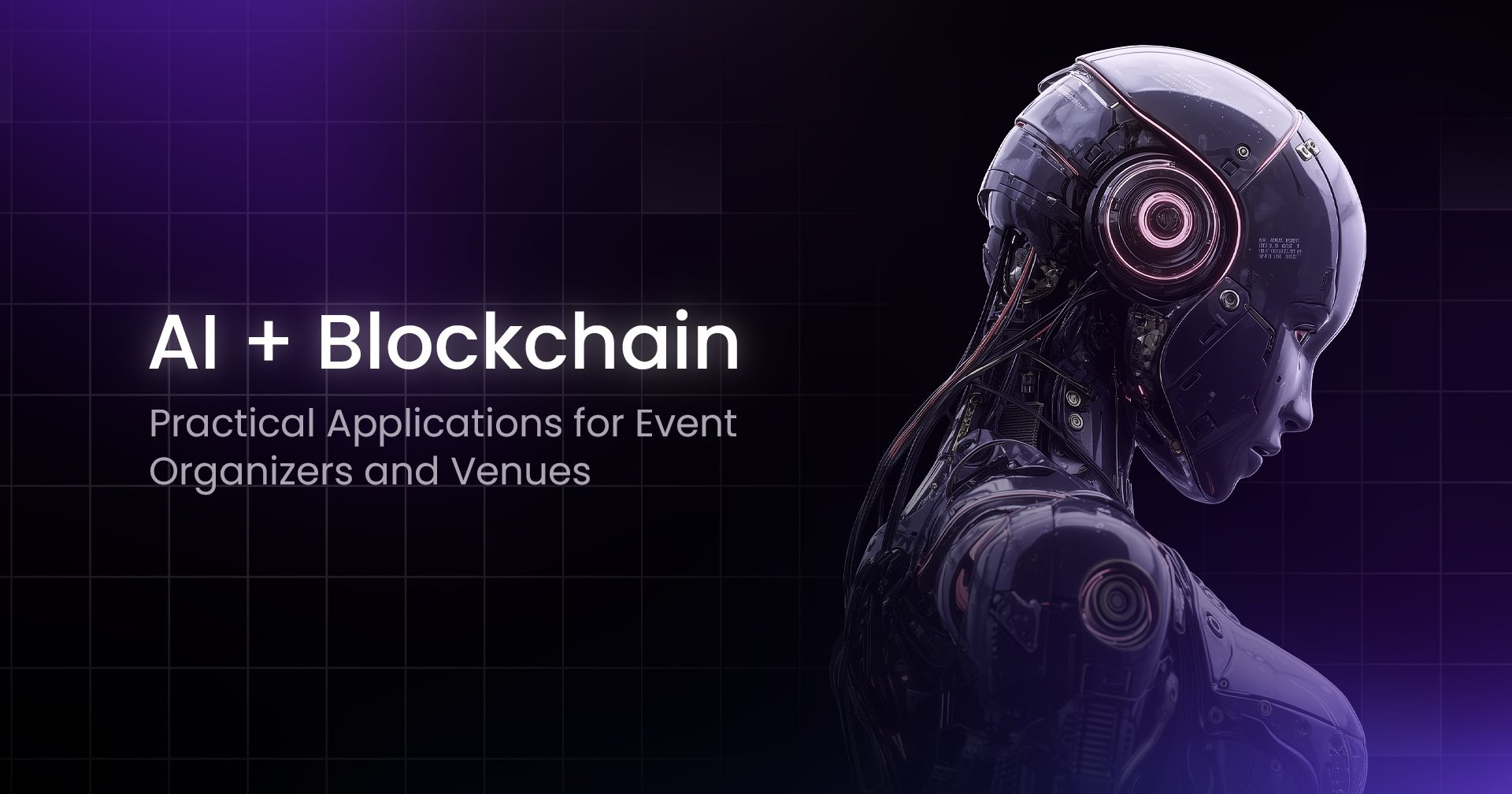
AI + Blockchain: Practical Applications for Event Organizers and Venues
Event ticketing fraud cost organizers over $700 million in 2023 alone. But what if AI and blockchain could eliminate that risk entirely?
The convergence of artificial intelligence and blockchain technology is creating unprecedented opportunities for event organizers and venue operators. While the industry has begun exploring these technologies individually, their combined implementation offers transformative solutions that address persistent challenges in event management, attendee experience, and operational efficiency.
Strategic Implementation Areas
The integration of AI and blockchain creates synergistic effects across multiple operational domains. Smart contracts powered by AI algorithms can automatically adjust pricing based on real-time demand patterns, weather conditions, and competitor analysis. These systems eliminate manual intervention while ensuring optimal revenue generation and fair market pricing.
Venue capacity management represents another critical application area. AI-driven crowd flow analysis, combined with blockchain-verified attendance records, enables dynamic space allocation and safety protocol enforcement. This integration provides venue operators with unprecedented visibility into crowd dynamics while maintaining tamper-proof attendance documentation for regulatory compliance.
Revenue Optimization Applications
- Dynamic pricing algorithms
- Automated refund processing
- Real-time inventory management
- Predictive demand forecasting
- Cross-event upselling automation
- Loyalty program integration
- Sponsor ROI tracking
- Merchandise sales optimization
Operational Efficiency Solutions
- Automated vendor payments
- Smart contract compliance
- Attendee verification systems
- Equipment tracking protocols
- Staff scheduling optimization
- Energy consumption monitoring
- Waste management automation
- Security incident documentation
Real-World Implementation Examples
Smart Entry and Access Control
Madison Square Garden's Smart Arena Initiative exemplifies practical AI-blockchain integration. The venue employs AI-powered facial recognition systems that interface with blockchain-verified ticket ownership. When attendees approach entry points, AI algorithms instantly verify identity against blockchain records.
Results: 60% reduction in entry times and complete elimination of fraudulent access attempts.
The system automatically logs attendance data to immutable blockchain records, providing accurate capacity tracking and enabling dynamic pricing adjustments for future events.
Intelligent Crowd Management
Ultra Music Festival's Crowd Management System demonstrates sophisticated operational integration. Their AI algorithms analyze social media sentiment, weather forecasts, and historical attendance patterns to predict crowd surges. This data feeds into blockchain-smart contracts that automatically trigger additional security deployments, adjust stage scheduling, and modify vendor allocations.
Results: 40% reduction in safety incidents and improved attendee satisfaction through optimized logistics.
Automated Supply Chain Operations
The O2 Arena's Vendor Ecosystem showcases supply chain optimization through AI-blockchain convergence. AI algorithms monitor concession sales patterns, predict inventory needs, and automatically generate purchase orders. Blockchain smart contracts execute payments to suppliers upon delivery verification.
Results: 35% reduction in administrative overhead and elimination of payment delays to suppliers.
The system maintains transparent supply chain records while optimizing inventory levels based on predictive analytics.
Advanced Applications in Practice
Personalized Attendee Experiences
Personalization engines powered by AI can analyze blockchain-recorded attendee behavior across multiple events to create individualized experiences. These systems track preferences, purchase histories, and engagement patterns while maintaining privacy through cryptographic protocols. Venues can offer customized recommendations, targeted promotions, and personalized content delivery without compromising attendee data security.
Automated Performer Compensation
Artist and performer compensation presents another compelling use case. AI algorithms can analyze streaming data, social media engagement, and ticket sales performance to calculate fair revenue distribution. Blockchain smart contracts automatically execute payments based on predetermined criteria, ensuring transparent and immediate compensation for all stakeholders.
Dynamic Risk Management
Insurance and risk management benefit significantly from this technological convergence. AI systems continuously monitor weather conditions, crowd behavior, and security incidents while recording all data to blockchain ledgers. This creates comprehensive risk profiles that enable dynamic insurance pricing and automated claim processing, reducing costs for event organizers while improving coverage accuracy.
Implementation Considerations
Successful deployment requires careful consideration of scalability requirements and integration complexity. Organizations should prioritize use cases with clear ROI metrics and established success indicators. Pilot programs focusing on single applications, such as automated vendor payments or dynamic pricing, provide valuable learning opportunities before expanding to comprehensive systems.
Data governance and privacy compliance remain paramount concerns. Implementation strategies must address GDPR requirements, local privacy regulations, and attendee consent management while maintaining the transparency benefits of blockchain technology.
Ready to Transform Your Event Operations?
Belong.net helps forward-thinking venues implement NFT-based access control, dynamic pricing, and automated vendor payments—all powered by smart contracts and AI-driven logic. Our platform enables seamless integration of these advanced technologies without requiring extensive technical expertise.
The future of event management lies in intelligent automation that enhances human decision-making rather than replacing it. AI-blockchain integration provides the foundation for this evolution, offering event organizers and venues the tools necessary to optimize operations, improve attendee experiences, and build sustainable competitive advantages in an increasingly digital entertainment landscape.